
See Math. Learn Math. Love Math.
There’s a new program by MIND Research Institute right around the corner! InsightMath, our new neuroscience-based core K-6 curriculum will transform student learning by teaching the way the brain learns. Launching in spring 2024, InsightMath will further MIND’s mission to mathematically equip all students to solve the world's most challenging problems.
Built on 25 years of math education and neuroscientific research, InsightMath was co-designed in collaboration with communities of researchers, neuroscientists, educators, families, and students. InsightMath's approach to redefining math instruction will change how students learn math and offer a new educational framework to ensure students think critically, learn visually, and are fully engaged.

The program will also provide equitable access to deeper learning, support teachers with tools to help them facilitate and guide students, and ensure parents and families play an essential role in helping their children become agents of their own thinking and problem solving.
For 25 years, ST Math has brought visual models, spatial reasoning, and the perception-action cycle into the learning process. InsightMath expands this time-tested approach into a full-classroom curriculum experience that helps students—and teachers—become math-loving problem-solvers.
Nigel Nisbet, Vice President of Content Creation
Cultivating mathematicians and fostering growth were critical areas of focus when building this core curriculum. At MIND, we don’t want students to simply “survive math” or feel they’ve hit a “math ceiling.” InsightMath will offer a way for students to see the math around them, how it connects to their passions and interests, and how to dispel the notion that they are “not a math person.”
Let’s dive into some other aspects of InsightMath that will set this core curriculum apart!
Like ST Math, InsightMath is built on a foundation of neuroscientific research. It empowers educators to understand and apply the latest research in neuroscience and education, encouraging students to tackle unfamiliar math problems, recognize patterns, and build deep conceptual understanding.
InsightMath will also include formative strategies, tools, and assessments for teachers and students to inform teaching and learning. Our formative assessment practices are designed to (1) center and empower students and (2) position and support teachers. In other words, InsightMath assessments are informative for the teacher and the student. Both have a shared role and responsibility.
InsightMath supports students in seeing themselves as capable and confident problem solvers. Through sharing strategies, thoughts, and perspectives, students rely on each other as mathematical resources and build on each other's ideas.
Students of all backgrounds can access InsightMath lessons. There are no language barriers. Teaching math how the brain learns avoids algorithmic approaches by allowing students to be creators of their own knowledge and ensures equitable access to deeper learning.

Every student, teacher, administrator, family, and community has the capacity to see themselves in math. InsightMath, like ST Math, can change students' relationship with math. It will create a whole student ecosystem that invites students to see, explore, and embrace their innate mathematical abilities.
InsightMath provides tools, resources, and training that empower teachers to bring out the best in every student. Teachers can (1) facilitate student thinking, (2) position students as authors of their own learning, and (3) support students in developing the "soft" skills.
Teachers are equipped with the neuroscience of math research and effective strategies to alleviate any math anxiety that may surface as they deliver personalized instructions. Through an asset-based approach to learning, teachers can seize opportunities when students respond incorrectly and discover ways to propel them forward.
Parents and families play a significant role in helping their children develop creative and rigorous problem-solving skills that support deeper learning. When a child is stuck on an InsightMath problem, parents can encourage them to take risks and learn from their mistakes. Instead of showing students how to solve a problem, parents can become facilitators by asking probing questions to guide students through their homework.
We had the privilege of previewing our new core curriculum to education partners at the National Council of Supervisors of Mathematics (NCSM) Annual Conference and the National Council of Teachers of Mathematics (NCTM) Annual Meeting and Exposition the week of September 26, 2022! Here are some of our favorite moments from the week.
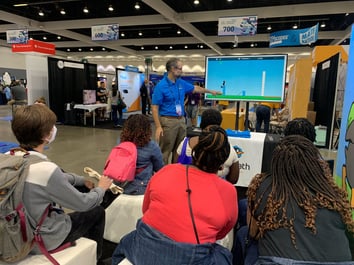
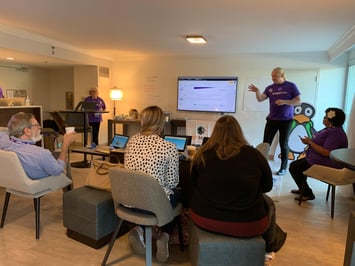
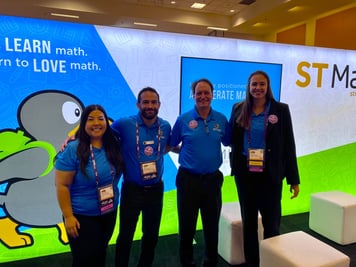

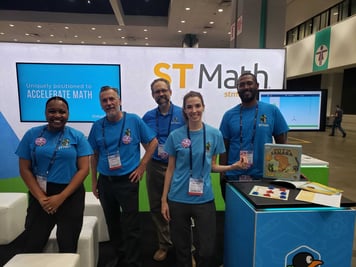
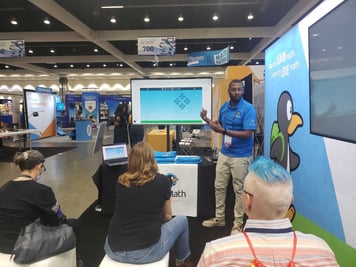
We can’t wait to share more information about InsightMath and all of the thought and creativity that went into its development! Stay informed by subscribing to the blog and following us on social media. You can also sign up for updates specific to InsightMath at insightmath.com.

Victor Nguyen is MIND’s Content and Community Specialist. Victor is a passionate storyteller with a penchant for creative writing. In his free time, you can find him engrossed in books, going on long hikes, or trying to meditate.
Comment